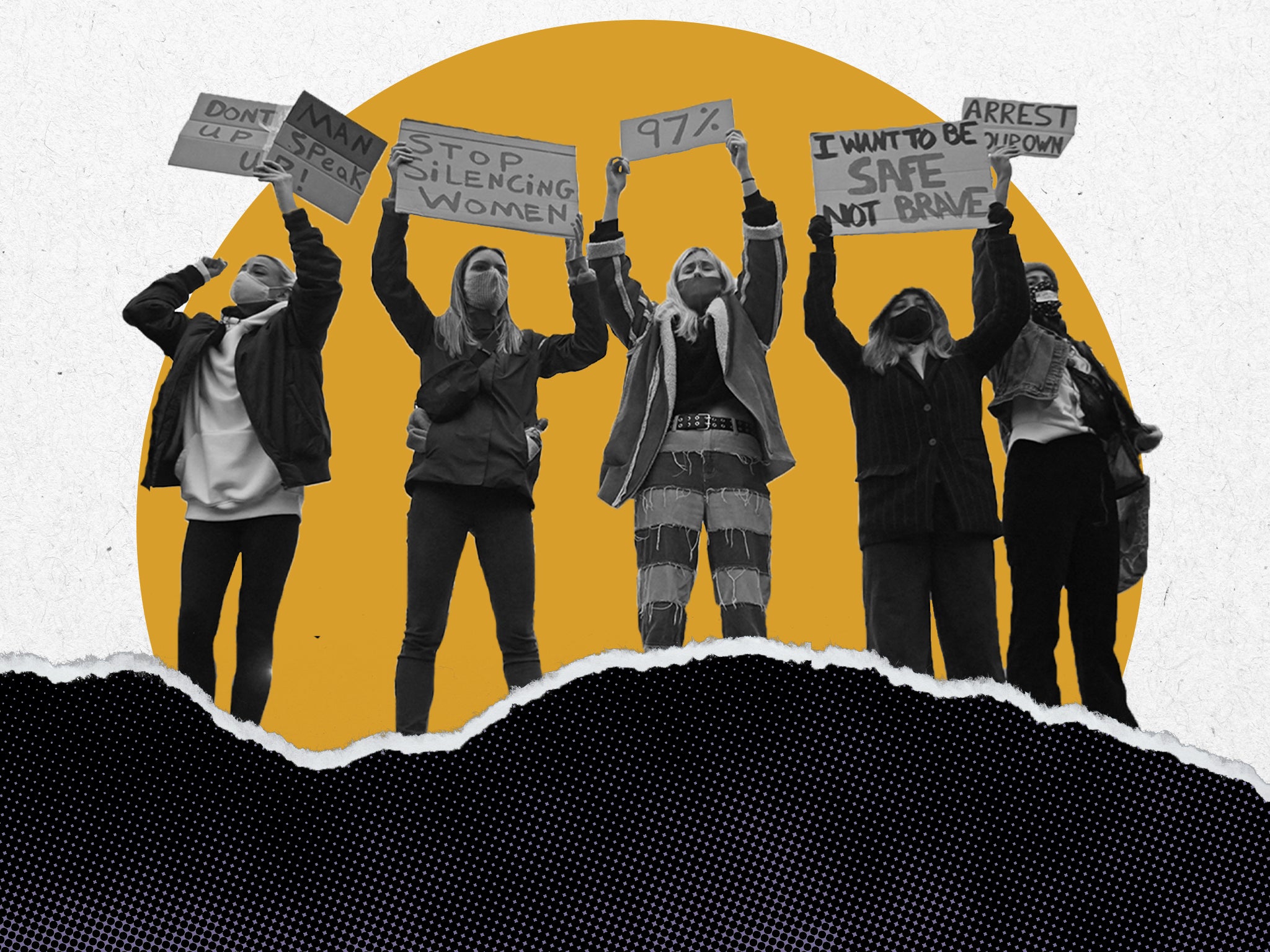International Women’s Day: 7 key issues that need to change for women in the UK
From rolling out telemedicine for abortion permanently to making period products free, Maya Oppenheim explores what must change


Your support helps us to tell the story
From reproductive rights to climate change to Big Tech, The Independent is on the ground when the story is developing. Whether it's investigating the financials of Elon Musk's pro-Trump PAC or producing our latest documentary, 'The A Word', which shines a light on the American women fighting for reproductive rights, we know how important it is to parse out the facts from the messaging.
At such a critical moment in US history, we need reporters on the ground. Your donation allows us to keep sending journalists to speak to both sides of the story.
The Independent is trusted by Americans across the entire political spectrum. And unlike many other quality news outlets, we choose not to lock Americans out of our reporting and analysis with paywalls. We believe quality journalism should be available to everyone, paid for by those who can afford it.
Your support makes all the difference.International Women’s Day offers up a chance to reflect on women’s achievements and consider the battles that still need to be won.
And when you live in a country where two to three women are murdered each week by their partners or ex-partners and there are no female Supreme Court justices, metro mayors, FTSE 100 chief execs or police and crime commissioners, it is clear there is still progress to be made.
The Independent has therefore compiled a list of seven key issues which still need to be overhauled on International Women’s Day.
Make period products free
Period products are as vital to women as soap and toilet roll, but yet are not freely accessible in the UK. A previous study found the average lifetime cost of forking out on period products and other items to make your period more bearable is estimated to be over £18,000. As such, period poverty is a major problem across the UK, with the issue surging in the wake of the pandemic.
For this reason, campaigners have long been calling for period products to be free in England and Wales. Scotland became the first country in the world to provide free period products in November 2020. In a similar vein, in 2019, the government announced girls at primary and secondary schools in England and Wales would be given free sanitary products from early 2020. But why not take it a step further and ensure period products are free in public institutions, such as restaurants, shops, bars, clubs, museums, public toilets, universities, religious settings, community centres and workplaces?
Make telemedicine for abortion permanent
Last month the government provoked consternation and anger among healthcare providers after announcing measures allowing abortion pills to be taken at home will be axed in September. Before the pandemic, getting the first abortion tablet, mifepristone, required a visit to an abortion clinic, but the government allowed early medical abortion medication to be sent via post to be taken at home after Covid hit.
The rules permitting at-home care were due to run out imminently, on 25 March, with the government long delaying announcing whether the provision would be made permanent despite repeated requests for clarification from abortion providers. While the government has said telemedicine – which sees consultation carried out via phone and abortion pills posted – will be withdrawn, ministers have also pledged to keep the issue under review.
The move to revoke telemedicine was fiercely criticised by abortion providers and healthcare professionals. Clare Murphy, who is chief executive of the British Pregnancy Advisory Service, the UK’s largest abortion provider, said revoking telemedicine for medical abortions “would be a shameful betrayal of women and a decision devoid of both evidence or justice”.
The UK’s largest study into abortions found at-home early medical abortions pose no greater risk and allow women to have the procedure much earlier on. England’s decision is at loggerheads with Wales, who is making the provision to take abortion pills at home permanent.
Online harm bill must bolster protection internet regulators provide
Online abuse is often downplayed as being less harmful than in-person harassment, but its repercussions can be no less destructive and distressing for victims. Social media’s 24/7 nature and ability to transcend geographical boundaries means perpetrators can harangue and threaten their victims at all times of the day and night.
Campaigners warn if the online harm bill referenced violence against women and girls, internet regulators would be better held to account and forced to take online abuse more seriously. The End Violence Against Women and Girls Coalition, a leading organisation, is calling for the government to alter the legislation.
If the bill’s wording is changed, internet providers and platforms would be legally required to tackle violence against women and girls on their platforms, such as addressing men who groom girls online, far-right incel online activity, revenge porn, cyber abuse, online domestic abuse and stalking. It is particularly pressing that we tackle this problem, given many of these issues have skyrocketed in the wake of the pandemic as more people spend time online.
More protections for migrant women suffering domestic abuse
If you are a migrant woman whose partner is abusing you psychologically or physically, it is far trickier to seek help in the UK. Many migrants do not have access to public funds, which means they are refused help by the authorities. Migrant victims of domestic abuse are thus denied support to leave their partners and refused refuge space. Furthermore, campaigners have long warned migrant women’s immigration status is routinely wielded as a “weapon to abuse” them by their partners.
Frontline service providers say women with unsettled immigration status who are suffering domestic violence are often too fearful to report the abuse due to fears police will share their data with the Home Office and they will face deportation. Migrant women were excluded from the government’s landmark domestic abuse bill last year despite frontline services calling for them to be included. While the apparent sharing of data between the Home Office and the police must stop, measures must be enacted to ensure migrant domestic abuse victims are provided with refuge space and supported.
Bolstered paternity leave and pay for fathers
While studies show new fathers are very keen to spend time off work with their babies, the pitiful amount of money provided for paternity leave means many men are simply not able to do so.
The current system gives fathers only two weeks off work for paternity leave, for which they are only paid £300. Recent research discovered the number of fathers taking paternity leave has plummeted to a 10-year low, with only around a quarter of eligible fathers taking time off work after their child is born.
But the coalition government’s flagship policy of shared parental leave has faced criticism, with campaigners and economists last year warning it is a “deeply flawed and chronically failing policy” that must be axed and replaced with different measures. Parents in Britain can choose to take shared parental leave of up to 50 weeks, while paternity leave is currently 14 days, and fathers are given either £151.20 per week, or 90 per cent of their average weekly earnings – whichever sum is lower.
Irrespective of the exact details of what the new provision would look like for fathers, it is clear paternity leave provision must be profoundly bolstered so new fathers are in a better position to take time off.
Buffer zones must be introduced outside abortion clinics to stop women being harassed
Having an abortion can already be a tough enough process for some women but being harassed, abused and threatened by anti-abortion protesters makes this far worse. Unfortunately, it is not an isolated issue, with more than 100,000 women attending clinics seeking a pregnancy termination targeted by anti-abortion demonstrations in 2019.
Common forms of abuse include protesters shouting “mum” or “murderer”, chasing women down the street and sharing pamphlets containing wholly false medical information. This sometimes even involves disseminating material that features incorrect claims that abortions cause breast cancer.
Abortion providers and campaigners have long been calling for the government to roll out “buffer zones” outside clinics nationally to stop anti-abortion protesters or any other types of demonstrators standing outside clinics or in their vicinity. Local councils are able to introduce such measures under legislation rolled out in 2014, with Ealing Council in west London introducing the UK’s first-ever “buffer zone” around an abortion clinic in 2018.
Register for serial perpetrators of domestic abuse and stalking should be rolled out
In a country in which women are frequently murdered by former and current partners and one in four women will suffer domestic abuse at some point during their lives, it is not surprising campaigners are adamant something needs to shift in how the scourge of domestic abuse is tackled. Many in the sector have been demanding the government place serial domestic abuse and stalking perpetrators on the existing violent and sexual offenders register and monitor them in the same way as serious sex offenders.
Laura Richards, a former top Metropolitan Police violent crime analyst, has been calling for a serial offenders register since 2004, while Labour MP Yvette Cooper has also more recently lent her backing to the proposal. Ms Richards, who helped develop the domestic homicide review process in the early 2000s and who is a former adviser to the National Police Chiefs Council, argues this must be rolled out as many offenders have a track record of domestic abuse.





Join our commenting forum
Join thought-provoking conversations, follow other Independent readers and see their replies
Comments